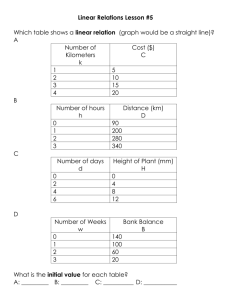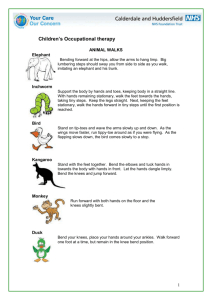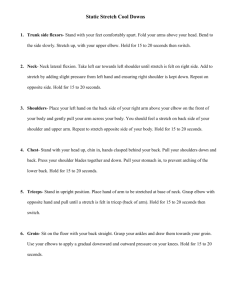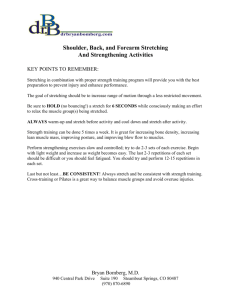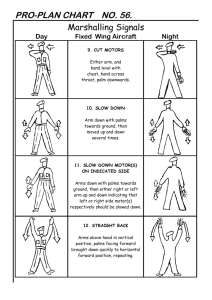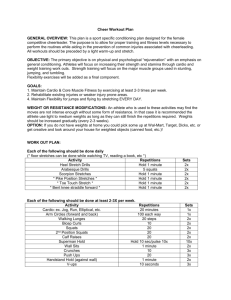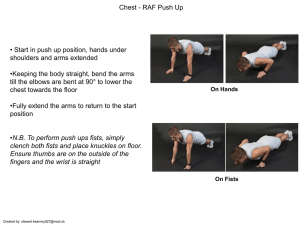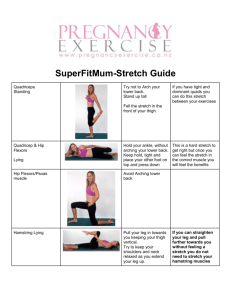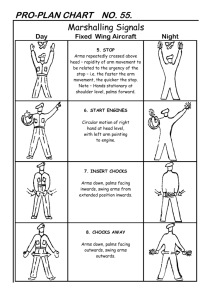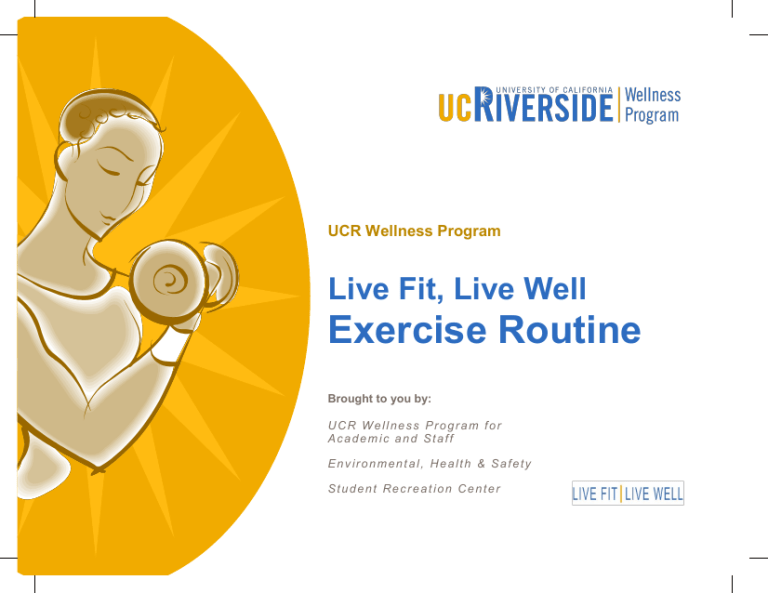
UCR Wellness Program
Live Fit, Live Well
Exercise Routine
Brought to you by:
UCR Wellness Program for
Academ ic and Staff
E n v ir o n m e n t a l , H e a l t h & S a f e t y
Student Recreation Center
General Information
Exercise disclaimer
In the interest of your safety, it is important
to check with your physician before
beginning any exercise program and to
exercise according to your fitness level and
capabilities. If you have any questions,
please seek the guidance of a wellness/
fitness/health professional.
Exercise recommendations
Cardiovascular exercise: Set a goal of at
least 30 minutes of moderate activity five
days/week or 20 minutes of vigorous
activity three days/week. You may divide
your 30 minutes into shorter sessions of 10
minutes each.
Strength training exercises: Do
strengthening exercises for all your major
muscle groups at least twice a week, on
alternating days to allow muscle recovery.
Stretching: It is recommended that you
perform a total body stretch before and after
your workout. All major muscle groups
should be stretched on a daily basis. Hold
each stretch for 15-30 seconds then repeat 23 times. Do not bounce.
3
Workout guidelines
Beginner: Perform 1-2 sets of 8-12 reps for
each exercise. Rest at least 30 seconds
between sets.
Intermediate: Perform 1-2 sets of 15-20 reps
for each exercise. Rest at least 30 seconds
between sets.
Advanced: Perform 2-3 sets for 15-20 reps
for each exercise and/or perform as a circuit.
To perform as a CIRCUIT, continue through
all of the exercises and repeat for a total of
two to three sets.
All: Warm up and stretch 3-5 minutes at the
start of your session and cool down and
stretch at the end of each session.
Tubing guidelines and precautions
Inspect tubing for tears before starting your
workout.
Hold the band securely.
You can adjust the level of tension on the
tubing. The looser the tubing, the easier the
resistance will be. To make the resistance
greater, adjust your hand position on the
tubing.
Keep wrists in neutral position throughout
each exercise movement.
Do not hyperextend or lock your joints.
Breathe evenly and exhale during the
exertion phase of the exercise.
Stop exercising if you don’t feel well or
feel pain while performing an exercise
movement.
All exercises can be performed with bands
or free weights
Strength Training — Lower Body
SQUAT
Stand straight, chest up, shoulders back and
feet shoulder width apart. (Tubing optional)
Keeping your back straight and abdominals
tight, squat until your legs are close to a 90degree angle.
Keep your weight in your heels and make
sure your knees do not extend past your
toes.
Return to standing without locking your
knees.
This can also be performed with dumbbells
held in each hand or no weight.
5
LUNGE
Step forward with one foot. (Tubing
optional)
Lower your body towards the floor
keeping your body upright and forming a
90-degree bend at the knee.
Make sure your front knee does not go
past your toes.
Return to standing without locking your
knees. Switch legs and repeat.
This can also be performed with
dumbbells held in each hand or no weight.
6
STANDING LEG ADDUCTION (Inner thigh)
Stand upright, using a chair for support if
needed.
Raise one foot slightly off of the floor.
Move your raised foot inward crossing over
and beyond your opposite foot.
Return to the starting position.
Repeat with your other leg.
Optional: Loop a Thera-Band® around legs
or use an ankle weight for added resistance.
7
STANDING LEG ABDUCTION (Outer thigh)
Stand upright, using a chair for support if
needed.
Raise one foot slightly off of the floor.
Move your raised foot outward, away from
your opposite foot.
Return to the starting position.
Repeat with your other leg.
Optional: Loop a Thera-Band® around legs
or use an ankle weight for added resistance.
8
STANDING CALF RAISE
Stand upright, using a chair for support if
needed.
Lift your heels off of the floor supporting
your weight on the toes and the balls of
your feet.
Return to the starting position.
For a more advanced workout, perform
this exercise one foot at a time.
9
Modified
For a greater range of motion, perform the
exercise on a step or stair.
Anatomy: Lower body muscles
Hip Muscles
Gluteal Muscles
Gluteus
Minimus
Gluteus
Maximus
ANTERIOR VIEW
Strength Training — Upper Body
SEATED ROW
Sit on the ground with feet extended, knees slightly bent, and back straight. Place tubing
around feet.
Pull elbows back while squeezing shoulder blades together.
Return to the starting position.
12
REVERSE FLY
Use light to medium dumbbells or water
bottles as weights.
Begin in a seated position, bent over, with
arms hanging down, and weights under the
knees.
Keep the back straight and the abs engaged.
Lift your arms out to the sides, up to shoulder
level, squeezing shoulder blades together.
Keep your elbows slightly bent.
Return to starting position.
PUSH-UPS
Place your hands on the floor slightly wider than shoulder width apart.
Keep your knees on the floor or balance on your toes (more advanced).
Lower your entire body to a 90-degree bend in the elbows, with your chest a few inches
from the floor.
Modified
Push up until your arms are straight, but not locked.
14
CHEST PRESS
Wrap tubing behind your back.
With your palms facing down towards the
floor, run the tubing across the elbow
joint, along the forearm, grasping tubing
in your hands.
With arms at 90 degrees, straighten your
arms in front of you without locking your
elbows.
Bring arms together towards the midline
of the body and reverse movement back to
90 degrees.
15
BICEP CURL
Anchor tubing under one or both feet
standing shoulder width apart.
With palms facing away from you, bend at
the elbows, raising your hands towards your
face. Squeeze your biceps at the top without
moving upper arm.
Return to the starting position.
16
OVERHEAD TRICEP EXTENSION
With one arm, hold band up behind your
back.
With your opposite arm, grab onto band.
Keep your top arm/elbow next to your ear
and wrist straight.
Straighten arm up towards ceiling.
Do not lock your elbows.
Return to starting position.
17
UPRIGHT ROW
Stand on the tubing with one or two feet.
Stand straight, chest up and shoulders back,
hands hands
back,
by your
byside,
yourpalms
side, palms
facingfacing
towards
your body.
towards
your body.
Raise your hands towards your face,
keeping elbows high. Stop when hands are
about level with your chin.
Lower to starting position.
18
SHRUG
Anchor tubing under both feet, standing
shoulder width apart.
Stand straight, chest up and shoulder
blades back, hands by your side, palms
facing towards your body.
Raise your shoulders up towards your ears
and release down.
19
FRONT RAISE
Stand on the tubing with one or two feet,
standing shoulder width apart.
Stand straight, chest up and shoulder
blades back, hands by your side, palms
facing towards your body.
Raise arms in front of you to shoulder
height, keeping knees slightly bent
throughout the movement.
Return to starting position.
20
LATERAL RAISE
Stand on the tubing with one or two feet,
standing shoulder width apart.
Stand straight, chest up and shoulder
blades back, hands by your side.
With palms down, thumbs facing forward,
raise your arms out to the sides to shoulder
height.
Keep elbows slightly bent, not locked.
Return to starting position.
21
Anatomy: Upper body muscles
Core Strengthening
Core strengthening guidelines
Core strengthening should be performed on most days of the week. Think of your core as a
strong column that links the upper body and lower body together. Having a solid core creates
a foundation for all activities, and is especially important when you add a heavy load, such as
weights, to your workout.
It is important when you are strengthening the core that you create balance between the
muscles of the abdomen and the back. Many people will naturally have an imbalance
between the strength of their abdominal muscles and the lower-back muscles. Performing
these exercises will help to develop and strengthen those muscles.
PELVIC TILT
Lie on your back with the knees bent and
feet flat on the floor. (Neutral position)
Inhale then as you exhale, gently rock
your hips towards your face, pressing your
lower back into the floor. Your buttocks
do not leave the floor.
Hold for a few seconds then inhale and
return to your neutral position.
Repeat this movement 5 to 10 times.
24
BRIDGE
Lie on your back with knees bent, feet flat
on the floor, and arms down by your sides.
Lift hips up until body is straight. Hold
then return hips to the floor.
Complete 15-20 repetitions, 1-3 sets.
25
CRUNCH
Lie on your back with knees bent, feet flat
on the floor, and hands behind your head.
While squeezing abdominals, lift chin
towards ceiling and exhale raising only
your shoulder blades off the floor. Return
to starting position and repeat.
Complete 15-20 repetitions, 1-3 sets.
26
SUPINE REVERSE CRUNCHES
Lie on your back with legs lifted, knees bent at a 90 degree angle, and hands behind your
head. Exhale, contract your abdominal and hip flexor muscles, and slowly raise your hips
off the mat. Hold this position briefly.
Inhale and lower your spine back towards the mat slowly.
27
OBLIQUE CRUNCH
Lie on your back with knees bent, feet flat
on the floor, and hands behind your head
with elbows open out to the side.
Twist torso, lifting your shoulder in the
direction of the opposite knee, without
moving feet or knees. Return to starting
position and repeat.
Complete 15-20 repetitions, 1-3 sets.
28
SEATED TRUNK ROTATIONS
Sit on the floor with knees bent, feet
together, heels on the floor, and back
straight. (Optional: Hold weight or
medicine ball for added resistance.)
Exhale and slowly rotate your torso to one
side
Inhale and then gently exhale while
rotating completely to the opposite side.
Repeat the movement back and forth.
Advanced: Lean back halfway to the floor
and lift your legs off the floor. Keep your
knees bent and feet together during the
exercise. With each rotation bring the
elbow close to, but not to rest on the floor.
29
SUPERMAN
Lie on your back with your legs extended,
toes pointing away from your shins, arms
extended overhead with palms facing
down towards the floor. Relax your head
to align it with your spine.
Exhale, contract your abs and slowly raise
both legs a few inches off the floor and
raise both arms a few inches off the floor
simultaneously
Keep both legs and arms extended and
hold briefly.
Inhale and gently lower your legs and
arms back towards starting position
30
BIRD DOG (Alternating Arm and Leg Lifts)
Position yourself on your hands and knees,
back straight, and head in line with your
spine.
Raise left arm straight in front of you and
raise your right leg straight behind you.
Hold this position for 5 seconds. Return to
starting position and switch sides.
Complete 15-20 repetitions, 1-3 sets.
31
PLANK
Place elbows at a 90-degree angle on the
floor, head looking down, and toes on the
floor.
Keep your core tight, back straight and
hold the position for 30-45 seconds. Repeat 2-3 times.
Stretching
Stretching is an important part of any exercise program. Stretching helps to improve flexibility, range of motion, lengthen muscles, enhance blood flow, reduce muscular discomfort and
soreness, and improve posture.
Hold each position for 15-30 seconds.
Do not bounce during the stretch.
Take each stretch to a point of gentle tension and hold, breathing normally
Stretching should be relaxing, not painful.
Perform a total body stretch after each workout
33
QUADRICEP STRETCH
Gently pull heel toward buttocks until
stretch is felt.
Hold 15-30 seconds. Repeat with other
heel.
34
HAMSTRING STRETCH
Sitting on the floor with one leg extended,
other leg bent.
Reach forward towards ankle and foot of
extended leg, bending at the waist, keeping chest lifted until stretch is felt.
Hold 15-30 seconds. Repeat with other
leg.
35
THIGH (ADDUCTOR) STRETCH
Sit on the floor with knees bent and parallel to the floor, with soles of feet facing
each other.
Grasping feet with hands and bending
from hips, gently pull forward until stretch
is felt in the hip area.
Hold 15-30 seconds.
36
CALF STRETCH
Face a wall and stand a foot away from it.
Place hands on wall for support.
Extend one leg behind you, keeping both
feet flat on the floor, and knee of your
extended leg straight.
Lean toward the wall until you feel tension
in the calf muscle of the extended leg.
Hold for 15 seconds.
Repeat with the other leg.
37
BACK STRETCH
With fingers interlaced and palms out,
straighten arms out in front of you.
To deepen the stretch, tilt head down
towards chest.
Hold 15 seconds.
38
CHEST/BICEP STRETCH
With fingers interlaced behind back,
press arms down and back.
Hold 20 seconds.
39
TRICEP STRETCH
Pull elbow behind head until stretch is
felt.
Hold 15-30 seconds. Repeat with other
elbow.
40
SHOULDER STRETCH
Pull arm across chest grasping at the
elbow
Keep shoulders down and away from ear.
Hold 15 seconds.
Repeat other side.
41
OVERHEAD REACH
Interlace fingers above head.
With palms facing upwards, push arms
slightly back and up.
Hold 15 seconds.
42
ABDOMINAL STRETCH
Lie on the floor on your stomach.
With palms flat on the floor, slowly
extend your arms.
Keep the shoulders down and away from
the ears.
Hold this position for 30-60 seconds.
43
LAT STRETCH (Child’s Pose)
Kneel on the floor placing palms flat on
the floor in front of you.
Shift your weight back over your heels,
lengthening your spine, relaxing your
head and neck, and reaching forward
through your fingertips.
Breathe deeply and hold for 10-30 seconds
44
LOWER BACK STRETCH
Lying flat on your back, bring knee to chest
and hold. Hold 15-30 seconds.
Repeat with other knee.
Contact Information
For more information contact:
Julie Chobdee
Wellness Program Coordinator, Human Resources
e-mail: julie.chobdee@ucr.edu
phone: (951) 827-1488
www.wellness.ucr.edu
Credits
Models
Technical Advisor
Nicole Butterfield
Ergonomic Specialist,
Environmental Health and Safety
Kristie Elton
Ergonomics Specialist/Physical Therapist,
Environmental Health and Safety
Julie Chobdee
Wellness Program Coordinator,
Human Resources
Photography, layout, and editing
Michelle Sansone
Fitness Wellness Coordinator,
Student Recreation Center
Marilyn Parker
Program Administrative Assistant,
Human Resources
Copyright © 2009 University of California Riverside. All rights reserved.

